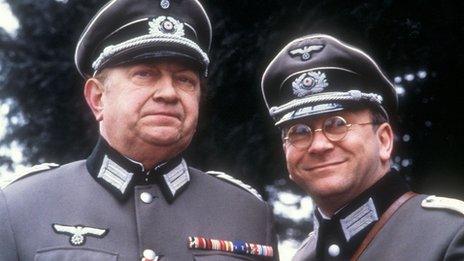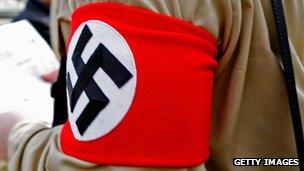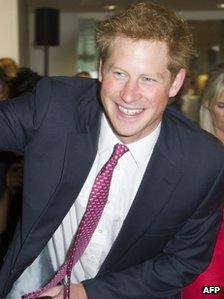How common is Nazi fancy dress?
- Published

The Wehrmacht uniform, rather than an SS outfit, is an option for an 'Allo 'Allo! party
A Conservative MP has apologised after reports he attended a stag party with Nazi overtones. But just how common is Nazi fancy dress?
From Hollywood superstars and comic book superheroes to leather-clad cowgirls and club-wielding cavemen, there are literally thousands of fancy dress outfits out there.
It is really very easy to avoid a controversial costume, but that does not seem to stop some people. And one of the most offensive outfits is a Nazi uniform, as Conservative MP Aidan Burley has discovered.
The MP for Cannock Chase in Staffordshire has been pictured in a national newspaper sitting next to another man dressed as an SS guard, external. Burley, who was on a stag do in a French ski resort at the time, has apologised for the "clearly inappropriate behaviour" of some of his friends.

In some countries, wearing a swastika armband in public would be illegal
But he is not the first person, and will surely not be the last, to hit the headlines over a Nazi costume.
Prince Harry is perhaps the most famous Nazi fancy dress costume-wearer in the world. In 2005, he was pictured wearing a German desert uniform and a swastika armband at a friend's birthday party. The fancy dress theme was "colonial and native".
In September, spectators were left open-mouthed when pupils at a school in Thailand revealed their surprise outfits , externalat the annual sports day. Many of the pupils were dressed in full Nazi regalia and were led into the sports ground by a young girl dressed as Adolf Hitler. Last year, a school in Australia apologised to parents after teachers awarded a costume prize to a child dressed as Hitler.
While it is difficult to quantify the people who go to parties dressed as a Nazi, it is easy to find the outfits on the internet or in fancy dress shops.
The Party Superstore in Clapham, south London, used to have eight black SS uniforms, with swastika badge and armband, before it lost its stock in an arson attack during the August riots.
"We used to hire one or two a month. Most of them were for uniform parties, others for villains and heroes parties," says Kui Nim.
They are also a popular choice for murder mystery parties, stag dos and bad taste parties.
But a shop assistant at MadWorld fancy dress hire in London says staff will ask the customer why they want the outfit and will warn them against parading about in public.
"We advise them not to wear the outfit on their way to the party - for example, we would tell them not to wear it on the Tube - we wouldn't want people being attacked or anything."
An SS uniform would include jacket, trousers, shirt, tie and military insignia - such as skulls and swastikas, but not typically a swastika arm band.
Military types would be able to spot the difference between the different uniforms of the SS, an elite fighting force who ran the death camps, and the Wehrmacht, Hitler's army, which is a popular choice for 'Allo 'Allo-themed parties.
But for the majority of people, all the German uniforms from the Nazi period have the same connotations.
It is for that reason that some fancy dress suppliers refuse to stock Nazi costumes.
Costume designer Jackie Haynes, who owns the House of Haynes in Manchester, says she is missing out on profit but doesn't want to be associated with such a terrible period of history.

Prince Harry caused a storm in 2005 when he wore Nazi insignia to a party
"Even if people do not have any dodgy motivations - they might want to go as Prince Harry - I wouldn't want to hire it out.
"I think it is a no-go area. You have to draw the line somewhere. It just turns my stomach. I don't think it's for partying."
But there is a time and a place for Nazi costumes - on a film set or theatre stage, in an exhibition or re-enactment.
Angels, the UK's largest and longest-established costumiers, supplies the film, television and theatre industry. But it does not offer Nazi costumes to the party-going public because they are just "bad taste".
"The majority of people who want them certainly do not share Hitler's views, rather grew-up watching 'Allo 'Allo! and Dad's Army and think it might be funny, but most, upon reflection, realise that dressing in such a manner is guaranteed to offend rather than amuse," says chairman Tim Angel.
Most costume shops would steer clear of providing anything that required certain military items, says Sylvia Luckman of the British Costume Association.
Some people might require German military outfits for an 'Allo, 'Allo! party, in which case they would be able to find a plain grey military jacket.
"But many shops won't have swastikas. We certainly haven't seen them at any of the trade shows. This really changed after 1990, when a Dutch supplier attended a big show over here.
"There was a small stall selling German military regalia, such as armbands with swastikas on them. The Dutchman went berserk - he had lost family in the camps. He refused to supply anyone stocking such items."
Ms Luckman says there is no directive within the industry not to provide such items, but "out of sheer common sense, it's a subject on which they tread carefully."